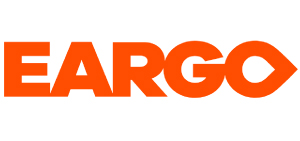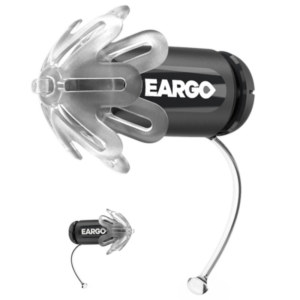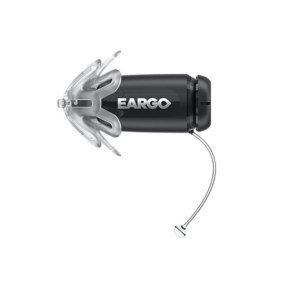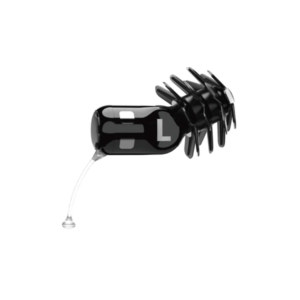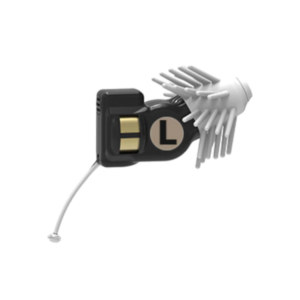Eargo Hearing Aids Review: Costs, Models, and Features
AgingInPlace.org keeps our resources free by working as an affiliate partner with some companies mentioned on our site. These partnerships or the commission we may earn do not affect our opinions or evaluations of the products we mention. Our reviews are solely based on our research methodology and from input from our AgingInPlace.org Advisory Board. Learn more about our ad policies.
Eargo Hearing Aids Review: Costs, Models, an...
Products carousel
Eargo hearing aids are over the counter, rechargeable hearing aids you can buy online without a formal hearing test and at a more affordable price than traditional prescription hearing aids. Eargo hearing aids are designed for those with mild to moderate high-frequency hearing loss, a common type of hearing loss frequently associated with aging and exposure to loud noises.
Headquartered in San Jose, California, Eargo stands out for its discreet, completely-in-canal design that, unlike your standard hearing aid that loops around your ear, goes unseen in your ear canal. Eargo hearing aids are about one-half inch long and as light as a paperclip.
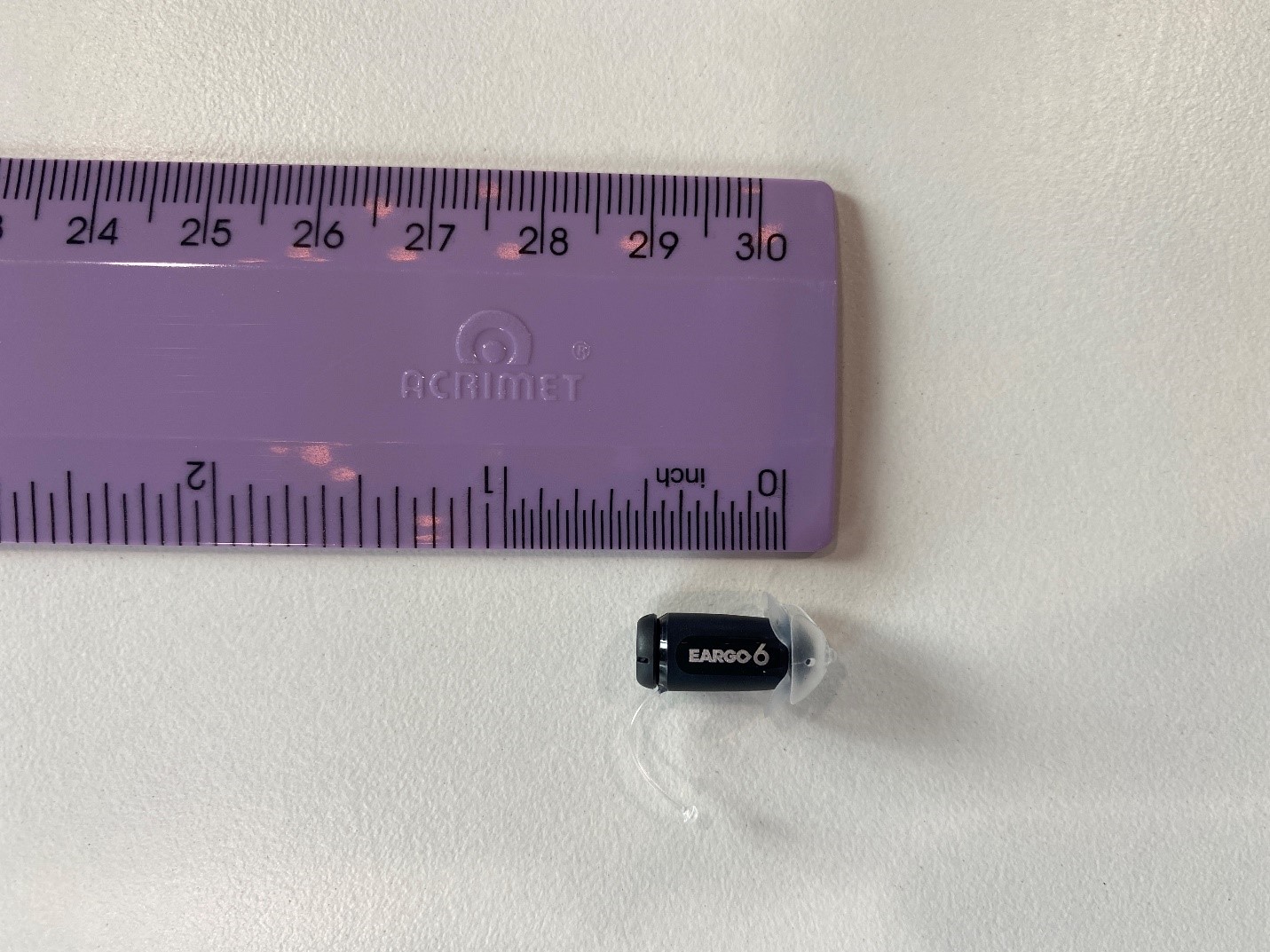
Eargo is also known for its knowledgeable and responsive customer service team of audiologists and hearing professionals who provide initial online hearing consultations to help you decide if Eargo hearing aids are right for you. If you purchase Eargo hearing aids, they’ll walk you through the self-fitting process once you receive them.
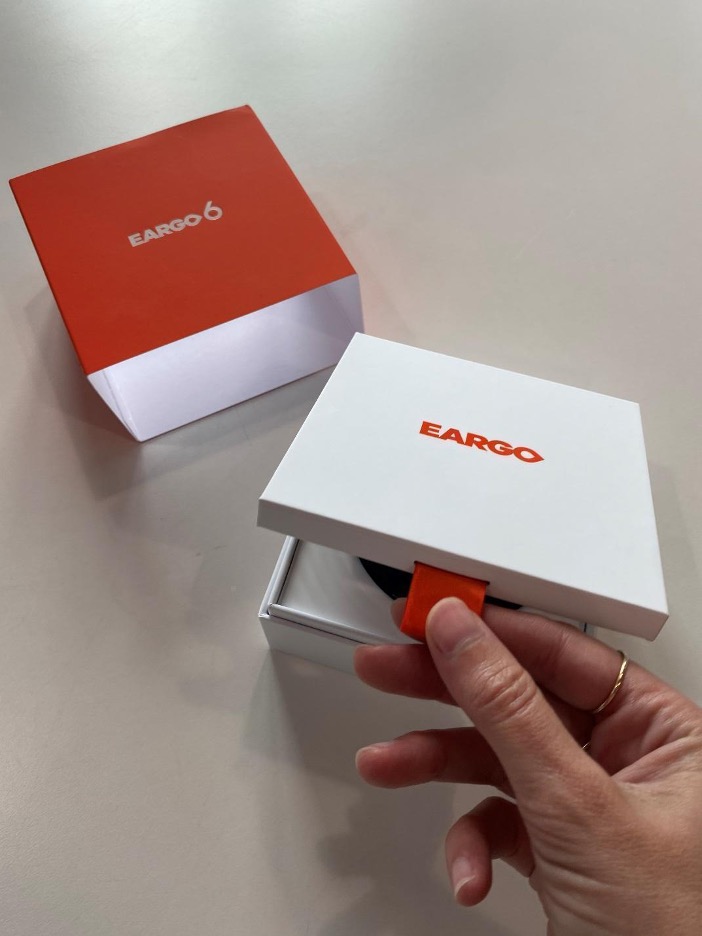
Review of Eargo Hearing Aids
We ranked Eargo as our second-best product in the lineup of hearing aids we tested during our 2022 Hearing Aids Summit, and we voted it best invisible hearing aid for its small size. You can see that it’s smaller than the diameter of a quarter. In our AgingInPlace.org 1000-response user survey, 91% of Eargo users said their hearing aids were a worthwhile purchase.
When we tested our Eargo hearing aids, we found the brand stood out against competitors for its easy user experience and good customer support. We also found Eargo hearing aids to be durable—they withstood us dropping them 10 times without any noticeable scratches or damage—and they were easy for us to clean and charge. The app was also easy to use, and the customer support team had a fast response time when we interacted with them.
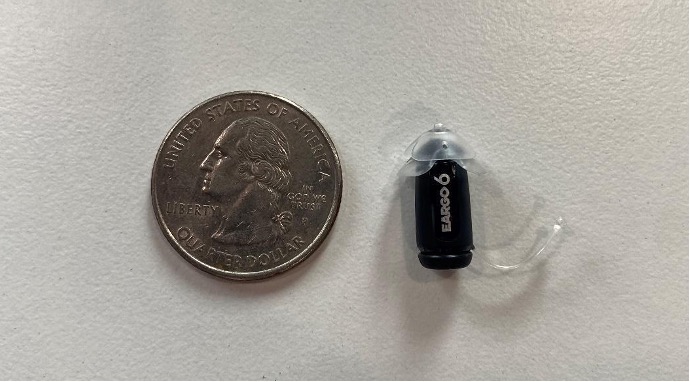
Because of their small size, Eargo hearing aids do not have Bluetooth streaming capabilities; they also don’t have telecoil or a tinnitus-masking feature. Audiologists have said that Eargo hearing aids don’t hold up well to sweat and moisture; but the brand’s newest model, the Eargo 6, is verified to be water resistant and withstood our water resistance test of submerging it in water for 30 minutes. When we shopped around on their website and searched for features, we found Eargo´s website was well organized and had a helpful search feature in the chat box that brought up more specific product information.
Pros and Cons of Eargo
Pros
-
The smallest hearing aids are at an affordable price
-
Rated as comfortable to wear
-
A free online hearing test available
-
Try before you buy option
Cons
-
Too small for Bluetooth streaming capabilities
-
Some models must be in the charger to connect to mobile app
-
Must be cleaned frequently because sensitivity to moisture
Why You Can Trust Our Expert Review
Our experts research and recommend products that can help give you a better quality of life. Using our high standards and rigorous testing methodology, we’ve spent more than 4,000 hours, collectively, researching the best hearing aids to help you find the device that’s best for you. Throughout our research process, we did the following:
- Consulted with audiologists and geriatric care experts
- Mystery shopped the brands
- Surveyed hundreds of hearing aid users
- Tested various models of hearing aids
- Interviewed experts in the field
- Read thousands of verified customer reviews
Learn more about our hearing aid full methodology.
Eargo Models
Eargo manufactures four hearing aid models: Eargo 6, Eargo 5, Eargo Neo HiFi and Eargo Max. All Eargo hearing aids are designed to amplify high-frequency sounds to treat mild to moderate high-frequency hearing loss, a type of hearing loss that makes conversation especially difficult to understand.
Eargo Max is the brand´s base model; while Eargo 6 is the top-of-the line model. Each model varies in size and the sound technology offered, with more expensive models being smaller and having better sound technology.
All Eargo models come with a wireless charger, a rechargeable battery with a similar battery life, a power cable and adapter, and several ear tips, which are the innermost tips of the hearing aid that shape how sound enters the ear. All Eargo hearing aids also come with four factory preset programs that vary by how much they amplify speech. You can switch between these programs by tapping on your ear while wearing the hearing aids. The ear tapping feature is paired with voice and audible tones that let you know you’ve made a change.
According to Eargo’s customer service team, all models are water resistant, but only the Eargo 6 has undergone official testing to be labeled as water resistant—we confirmed this at our 2022 Hearing Aids Summit.
A mobile app is available with all Eargo models except the Eargo Max.
Eargo Hearing Aids
Eargo 6 is the smallest in-canal, rechargeable hearing aid on the market.
Eargo 6 hearing aids come with environmental programs that they use to adjust their settings to your listening environment. Environmental programs include settings for restaurant, phone, TV, meeting, music, and mask (for listening to people wearing a face mask). Eargo 6 hearing aids themselves can store up to four of these environmental programs at a time for you to switch between them using the ear tapping feature. Alternatively, you can use your mobile app to select from any of the environmental programs, and program which ones are available with the ear tapping feature.
Eargo 6 is the most expensive Eargo model because it’s the only one to include a combination of more advanced sound technology with the features Sound Match, Sound Adjust, and Sound Tuning. The feature Sound Match tweaks your volume and pitch settings for each ear based on a hearing screening you complete on the app. After you complete the screen, Sound Match saves these settings and applies them to each environmental program to sharpen your hearing in different settings without you having to manually tweak them in different listening environments.
The feature Sound Adjust goes a step further by providing better sound technology to more precisely eliminate nonspeech frequencies and make speech clearer. You don’t have to complete a hearing screening with Sound Adjust—it functions automatically and is not tailored to the individual user. Eargo’s hearing professional told us this feature makes Eargo 6 their best hearing aid for people who aren’t comfortable making manual changes to their sound settings.
The Sound Tuning feature lets you use the app to make more specific adjustments to Eargo 6’s volume, treble, and bass settings for each ear. It will remember your settings so you don’t have to adjust them each time you put your hearing aids on for the day. Changing the treble will change the clarity and sharpness of sounds. Changing bass can increase volume in general or reduces volume for lower-pitched sounds. Eargo’s hearing professional also told us they can remotely make changes to Eargo 6’s sound features if users who don’t like using apps call them over the phone.
Eargo 6 has the best water resistance of all Eargo models, with a rating of IPX 7, which means they can withstand a water depth of less than one meter for up to 30 minutes without any damage.
Eargo 6, like Eargo 5, comes with four petal-style ear tips. Ear tips come in different sizes to fit various ear canals, and in different shapes to amplify sounds differently to accommodate both mild and moderate high-frequency hearing loss (read more below under the section “Ear tips”).
Eargo 6 comes with a cleaning brush and cleaning cloth.
Eargo 5 is the same size as Eargo 6, about one-half inch long, making it the other smallest in-canal, rechargeable hearing aid on the market. It was the first Eargo hearing aid model to feature the innovative petal design, inspired by the shape of a flower petal, for greater comfort and sound quality compared to ear tips of older models.
It has less sound technology than the Eargo 6 because it doesn’t have Sound Adjust. It does, however, have the same environmental programs as Eargo 6, Sound Match, and Sound Tuning.
Eargo 5 and Eargo 6 users can change their sound settings through the app while wearing their hearing aids; other Eargo models require you to place the hearing aids back in their charger to connect them to the app.
Eargo 5 comes with the same cleaning brush and cloth as Eargo 6.
Eargo Neo HiFi is slightly larger than Eargo 5 and Eargo 6 and doesn’t have their petal ear tips. Eargo Neo HiFi’s ear tips come in the shapes flexi tetrapalms and flexi fibers (read more below under the section “Ear tips”). Our medical reviewer, Rachel A. Magann Faivre, Au.D., told us that the Eargo Neo HiFi’s ear domes are less comfortable and have more potential for feedback than the petal tips of newer models.
Eargo Neo HiFi does not come with Sound Adjust, Sound Match, or environmental programs, but it has the four factory preset amplification programs, enhanced wind and noise reduction, and can accommodate a wider range of hearing loss with less feedback than older Eargo models. Its wind noise reduction allows for good performance outdoors, and its enhanced noise reduction allows for amplification of speech so people’s voices sound much crisper.
Unlike Eargo 5 and Eargo 6, Eargo Neo HiFi’s sound settings cannot be changed directly from the app while wearing the hearing aids. Eargo Neo HiFi hearing aids have to be in their charger to change their settings through the app.
Eargo Neo HiFi comes with cleaning accessories, including a cleaning brush and wax guard.
Eargo Max is Eargo’s most affordable hearing aid and is slightly smaller than Eargo Neo HiFi. Unlike all of Eargo’s other models, Eargo Max does not have a mobile app feature.
Like Eargo Neo HiFi, Eargo Max has advanced sound quality, noise reduction, and the four amplification programs. Since they don’t have app-connection capabilities, you have to double tap each ear while wearing the hearing aids to switch between amplification programs with Eargo Max.
Ear tips that come with Eargo Max are the flexi fiber and dome ear tips, some of which are the same as Eargo Neo HiFi’s flexi fiber tips. Eargo Max also comes with the same cleaning brush and wax guard as Eargo Neo HiFi.
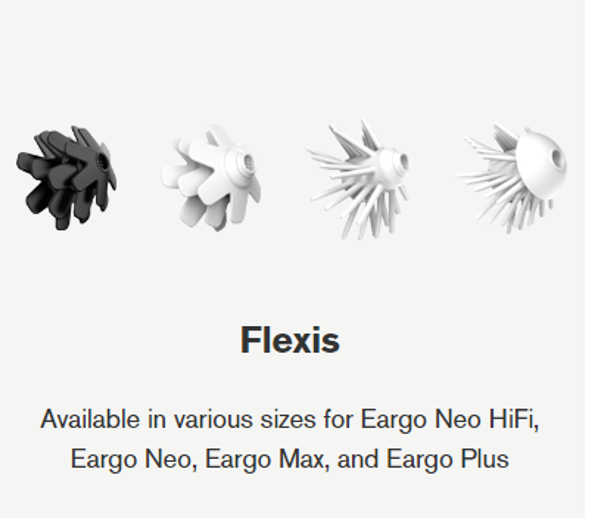
| Model | Hearing aid tips | Sound technology | Rechargeable battery | Smartphone app | Charging case |
|---|---|---|---|---|---|
| Eargo 6 | 4 petal tips | Sound Adjust Sound Match Sound tuning Environmental programs 4 amplification programs | Yes, 16-hour duration on one charge | Yes | Yes, connects to cradle via magnet |
| Eargo 5 | 4 petal tips | Sound Match Sound tuning Environmental programs 4 amplification programs | Yes, 16-hour duration on one charge | Yes | Yes, connects to cradle via magnet |
| Eargo Neo HiFi | 4 flexi tetrapalms 2 flexi fibers | Wind reduction Added stable gain 4 amplification programs | Yes, 16-hour duration on one charge | Yes | Yes, connects to cradle via contact pins |
| Eargo Max | 8 flexi fibers 2 flexi domes | 4 amplification programs | Yes, 16-hour duration on one charge | Yes | Yes, connects to cradle via contact pins |
| Model | ||||||||||||||||||||||||||||||||||||||||||||||||
| Eargo 6 | Hearing aid tips | 4 petal tips | Sound technology | Sound Adjust Sound Match Sound tuning Environmental programs 4 amplification programs | Rechargeable battery | Yes, 16-hour duration on one charge | Smartphone app | Yes | Charging case | Yes, connects to cradle via magnet |
|---|
| Eargo 5 | Hearing aid tips | 4 petal tips | Sound technology | Sound Match Sound tuning Environmental programs 4 amplification programs | Rechargeable battery | Yes, 16-hour duration on one charge | Smartphone app | Yes | Charging case | Yes, connects to cradle via magnet |
|---|
| Eargo Neo HiFi | Hearing aid tips | 4 flexi tetrapalms 2 flexi fibers | Sound technology | Wind reduction Added stable gain 4 amplification programs | Rechargeable battery | Yes, 16-hour duration on one charge | Smartphone app | Yes | Charging case | Yes, connects to cradle via contact pins |
|---|
| Eargo Max | Hearing aid tips | 8 flexi fibers 2 flexi domes | Sound technology | 4 amplification programs | Rechargeable battery | Yes, 16-hour duration on one charge | Smartphone app | Yes | Charging case | Yes, connects to cradle via contact pins |
|---|
Smartphone App and Key Features
Ear Tips
Eargo’s hearing devices come with medical-grade silicone ear tips (the flexible part of the hearing aid that fits into the ear canal first). Eargo’s ear tips are designed to help shape how sounds travel into the ear canal, with some letting lower frequencies—frequencies that don’t need amplification by hearing aids in high-frequency hearing loss—get past the hearing aid more easily than others. Some Eargo hearing aids differ by the shape and number of ear tips they come with. Shapes include the petal, tetraflexi, and flexi fiber.
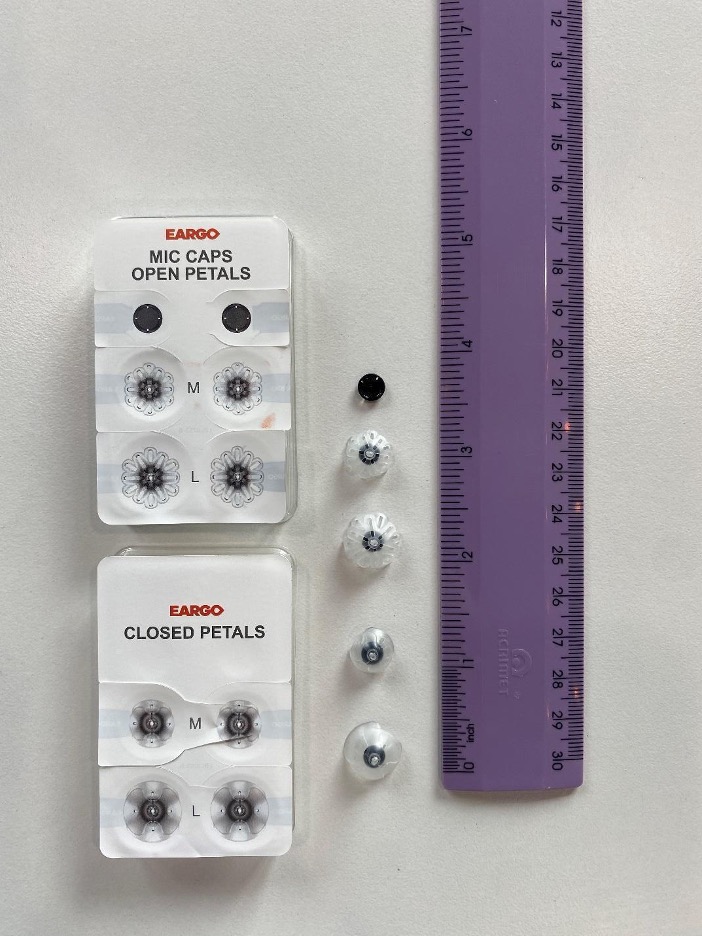
Eargo 6 and Eargo 5 come with petal tips in sizes medium and large and in open and closed styles. Since these direct-to-consumer hearing aids are not custom-fit to your ears, the two sizes offer some variety for users’ differing ear canals. Open petals are for users with near-normal low frequency hearing. Closed petals are for users who want to amplify sounds across a wider frequency range.
Eargo Neo HiFi and Eargo Max come with flexi ear tips in regular and large sizes. Eargo Neo HiFi’s compatible flexi tips are the flexi tetrapalm and flexi fibers. Flexi tetrapalms have an ultra-soft fourth layer that’s meant to keep the Neo HiFi in place better in the ear canal. Eargo Max’s compatible flexi tips are the flexi fibers and flexi domes. Flexi domes are meant to provide fuller sound quality, help decrease feedback, and amplify more sounds in the mid-frequency ranges, which are important for speech. Flexi fiber tips that come with both the Neo HiFi and the Max are meant to comfortably hold hearing aids in place and let low frequencies naturally flow through the canal while amplifying high frequencies.
Eargo recommends you replace ear tips about every two months, or when sound quality is decreased or wear and tear is visible. Replacement tips can be purchased online under Eargo accessories and cost between $25-$40 per tray of three pairs depending on the style.
Charging Case
All Eargo models come with the same style of charging case, but models attach differently to the charger and have different indicator lights for helping with placing hearing aids in the charger. Eargo chargers use inductive charging—a type of wireless charging.
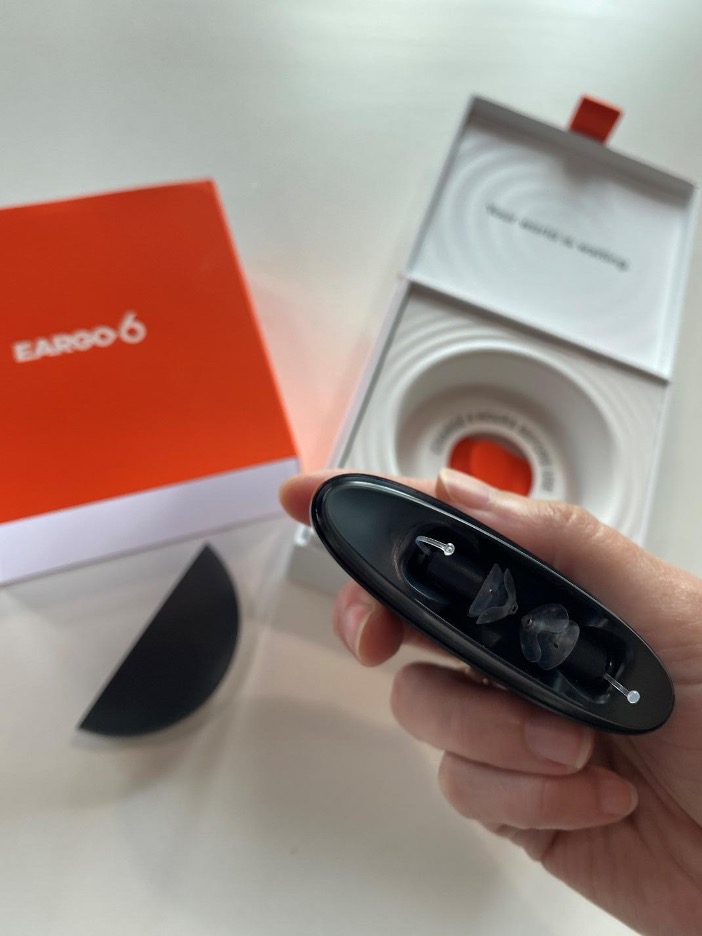
Eargo 6 and Eargo 5 hearing aids connect to the charger via magnets; Eargo Neo HiFi and Eargo Max connect via contact pins. You can fully charge an Eargo charger at an outlet in four hours and then use it as a portable charger for your hearing aids. The charger should be recharged every three days, and the Eargo app will prompt you when the charger’s battery life reaches 25%. Hearing aids can also be charged while the charger is charging.
Light indicators vary between Eargo devices. Eargo 5 and Eargo 6 have white cradle lights that illuminate when the hearing aids are not in the charger to help you place them correctly in their cradle. When placed and charging, their indicator lights will slowly pulse white. Once fully charged, indicator lights will be solid white. With Eargo Neo HiFi, lights won’t turn on until the hearing aids are placed in the charger. Eargo Max’s charging cradle illuminates blue for 10 seconds after users open the lid and will turn white once the hearing aids are placed correctly to charge. With all Eargo hearing aids, charger indicator lights will turn off about 10 seconds after correct placement to avoid draining the battery. Charger lights will also indicate when the charger needs to be recharged at a wall outlet by flashing rapidly.
When placing our Eargo 6 hearing aids into their charging cradle, we had to be especially careful in making sure their removal threads were positioned up rather than out to avoid damaging them when we closed the lid.
All Eargo models must be placed in their charger to receive software updates.
Sound Profile
All Eargo devices come with four preset amplification programs. Newer, more expensive Eargo hearing aids have better sound technology. Eargo 5 and Eargo 6 stand out for their environmental programs, Sound Tuning, and Sound Match technology that allow for more fine-tuned, personalized hearing settings specific to different listening environments. Eargo 6 goes a step further with Sound Adjust that makes noise reduction and amplification even more precise.
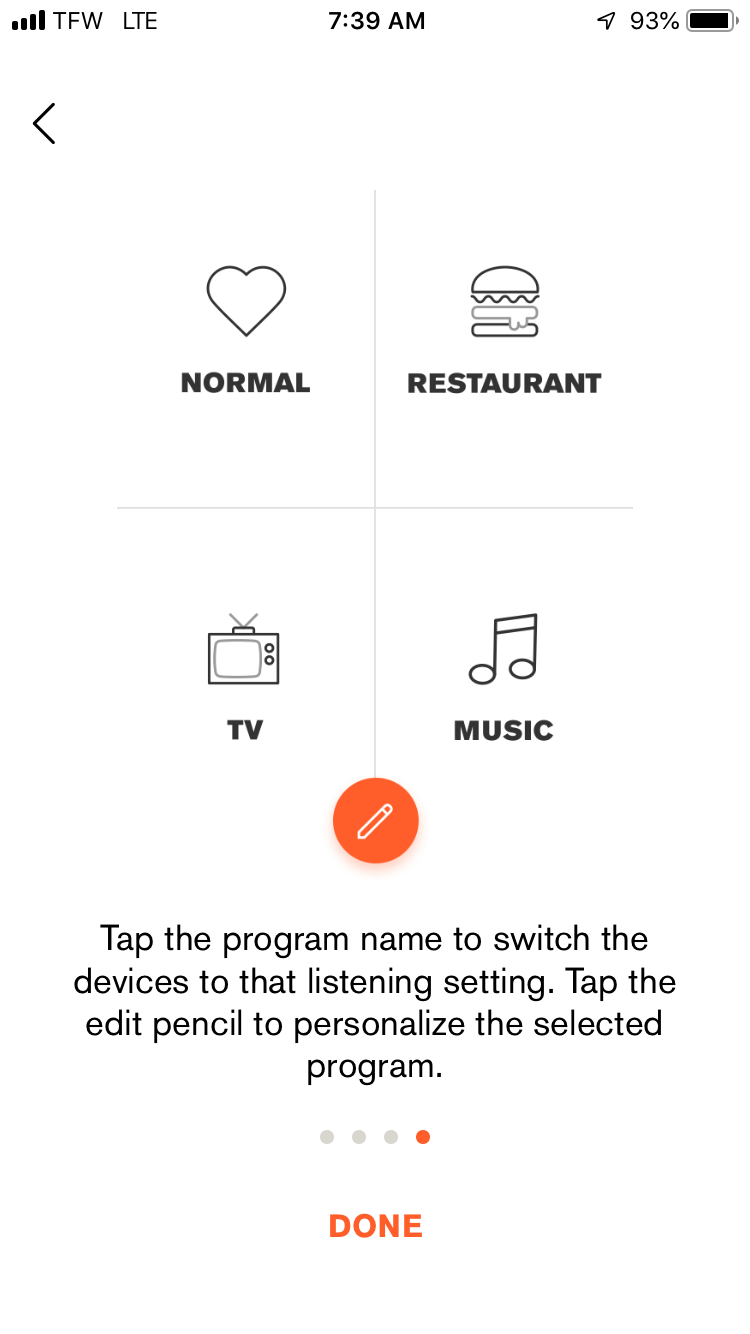
Except for Sound Adjust, which is automatically set, sound settings can be changed on the mobile app for app compatible Eargo models. However, if you’re not comfortable using an app, you can always call customer support to change your settings remotely, although you’ll need to place your hearing aids back in their charger to receive these updated settings.
All Eargo models are able to switch between amplification programs with the tap control feature, where you tap your ear to change the program when you don’t want to use the mobile app.About tap control, our medical reviewer Rachel A. Magann Faivre, Au.D., said, “The tap control system doesn’t work that well in all Eargo models. I’ve found [it] doesn’t activate reliably when you want it to and will activate when you don’t, such as [scratching] your ear.”
Smartphone Apps
Eargo’s smartphone app comes with all models except the Eargo Max. Eargo’s app is used to personalize settings for preset programs and switch between them. You can also use the app to text or video chat with Eargo’s customer support team and hearing professionals.
Eargo 5 and Eargo 6 can directly connect to the app from a smartphone or tablet via Bluetooth while you’re wearing these hearing aids. Eargo Neo HiFi must be in the charger to connect to the app. You can adjust the volume in one or both ears plus change the noise filter settings.
During our initial setup when testing the Eargo 6, it took approximately 10 minutes for Bluetooth to connect our hearing aids to the mobile app, about double the more typical 2-5 minutes for all the other hearing aid brands we tested.
The smartphone app is also used to contact Eargo customer support, including through video chat. Users can also use the app to watch product how-to videos and order Eargo accessories.
Rechargeable Battery
Eargo hearing aids have a battery life of 16 hours and can be fully recharged in about 2.5 hours, but the manufacturer recommends you charge the hearing aids overnight for best results. Like with your charger, the Eargo app will prompt you when your hearing aid battery life is at 25%.
The rechargeable battery is a lithium-ion battery with Eargo 5 and Eargo 6 and a nickel metal hydride battery with Eargo Neo HiFi and Eargo Max. All chargers have a lithium-ion battery.
Eargo Costs and Payment Options
Of the hearing aid brands we reviewed, Eargo offers some of the more affordable hearing aids, with prices normally ranging from $1,450-$2,950. The most to least expensive models are:
- Eargo 6: $2,950
- Eargo 5: $2,450
- Eargo Neo HiFi: $1,950
- Eargo Max: $1,450
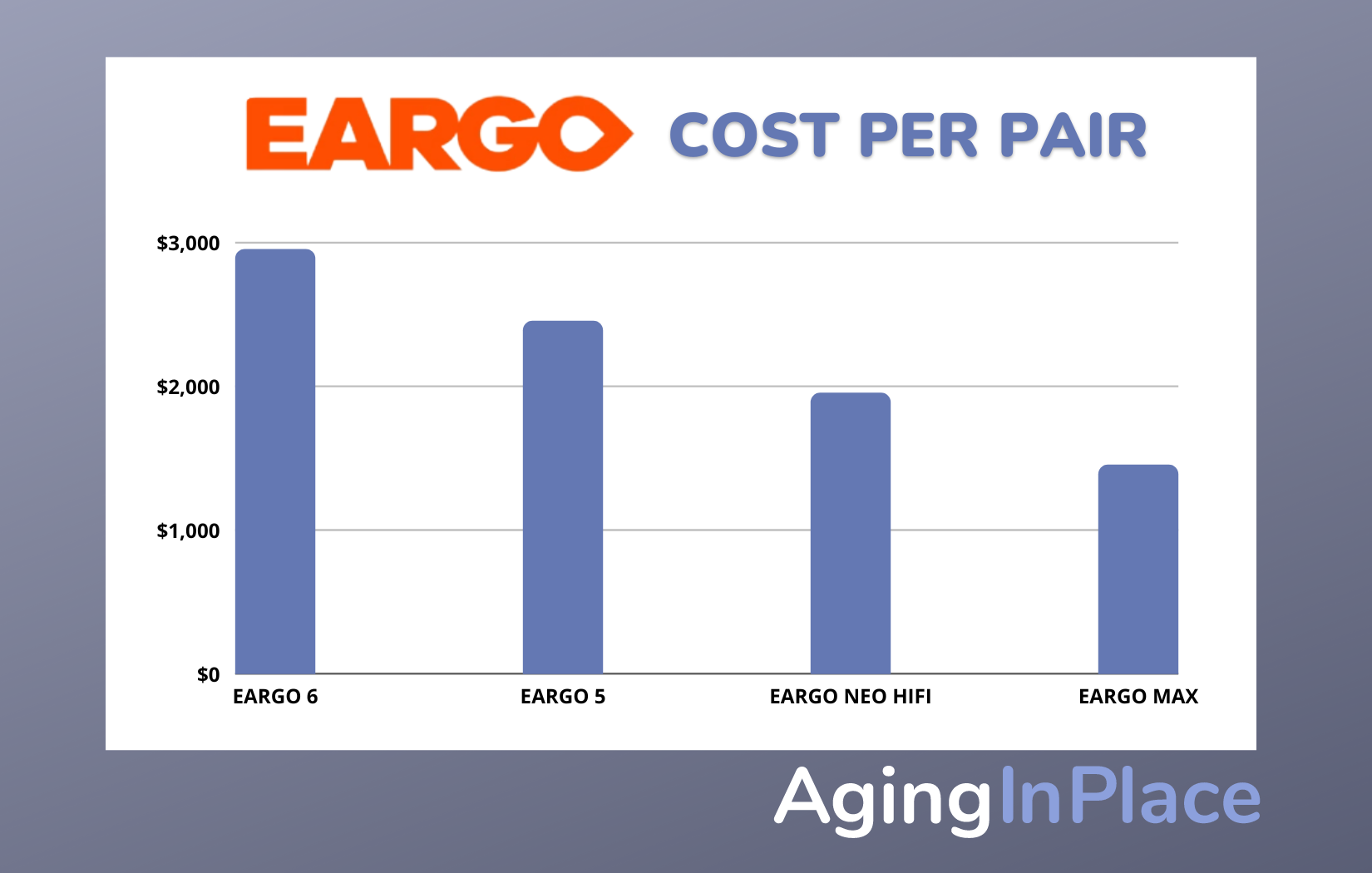
Eargo offers financing through the company Bread. Although monthly rate depends on your credit history and length of the repayment plan, each model can qualify for a rate as low as:
- Eargo 6: $96/month for 36 months
- Eargo 5: $80/month for 36 months
- Eargo Neo HiFi: $90/month for 36 months
- Eargo Max: $67/month for 36 months
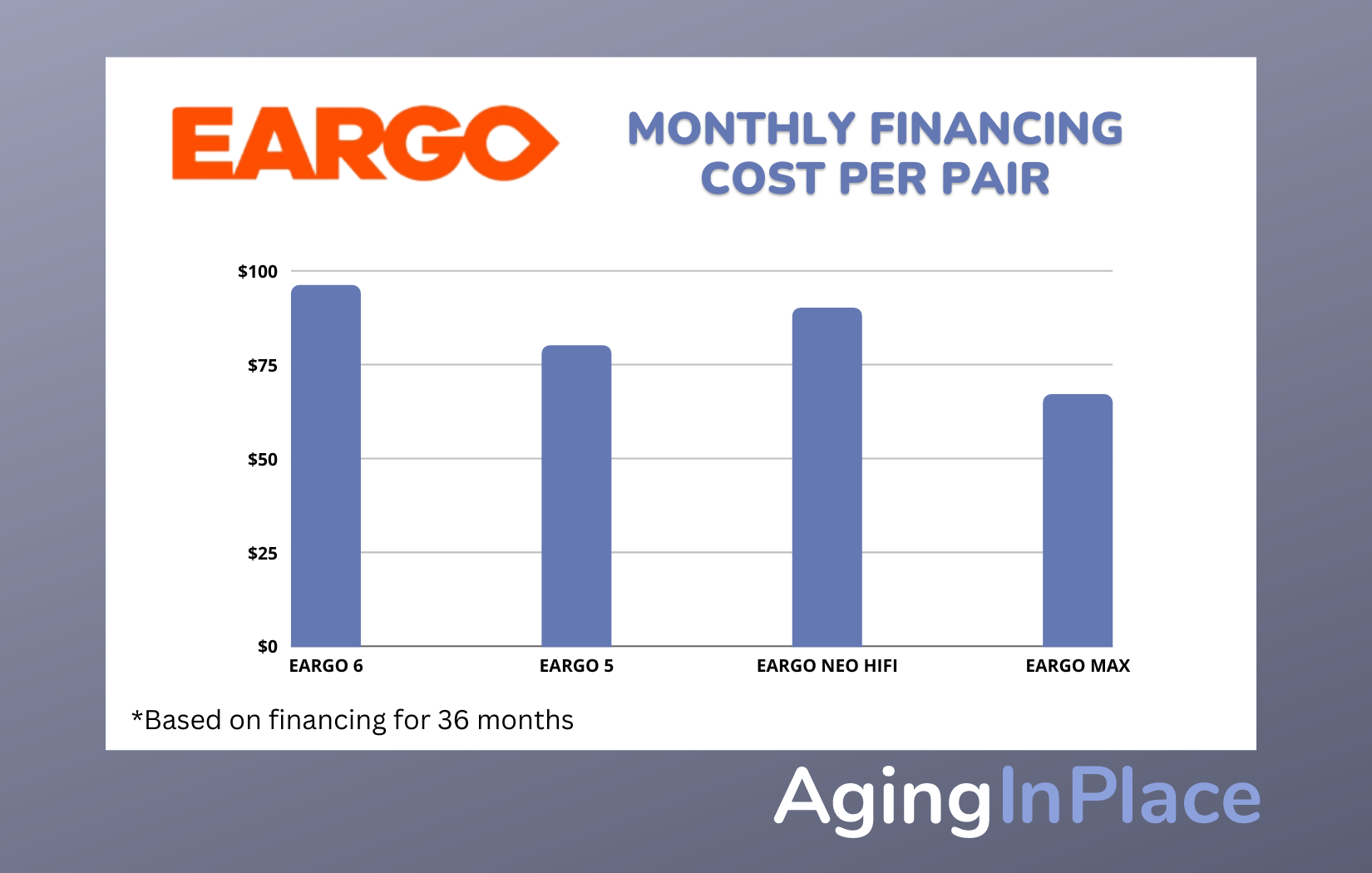
After getting approved for financing, you can choose a 12, 24, or 36-month repayment plan. Interest rates vary from 0%-8.99% depending on your credit history, loan amount, and the length of your repayment plan. Zero percent interest is available with 12 and 24-month plans only. There are no penalties for paying your loan off early. Bread’s financing application is fast and can be completed within a few seconds after providing your name, email, and phone number. Your credit score won’t be affected when you check to see if you prequalify for a loan.
Shipping with all Eargo products, including accessories alone, is free.
Medical insurance does not cover Eargo hearing aids, but HSA and FSA funds do.
Buying Experience
Although not required, Eargo recommends you speak with one of its hearing professionals on a phone call, or through a video chat, before purchasing Eargo hearing aids. These hearing professionals can identify which type of hearing loss you might have based on your symptom description and whether your hearing loss will likely respond to Eargo hearing aids. You can take Eargo’s online hearing screening beforehand or bring results from any other recent hearing test to discuss with them. They can show you demos of Eargo products and the mobile app and can also answer product-specific questions. If you do purchase Eargo hearing aids, a hearing professional can also walk you through the process of setting them up.
To purchase Eargo hearing aids, you can select them at the Eargo website under products. At checkout, you’ll have the option to pay with a debit/credit card, PayPal, or financing. You’ll be asked to check a couple of boxes. The first checkbox is agreeing to a medical waiver that states you’ve reviewed your chosen hearing aid’s user brochure from the product’s page, that you’re aware you can speak with a live customer representative, and that you’re knowingly purchasing hearing aids even if you haven’t had a medical evaluation for hearing loss. The second checkbox has you acknowledge that you have at least one sign of hearing loss based on a list they give you. After you place your order, you check out with Bread financing if you’ve applied for the financing option.
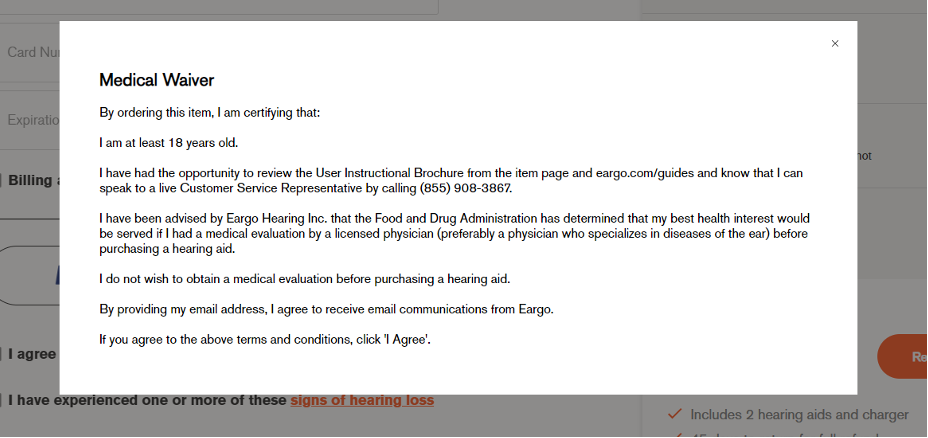
What Happened When We Scheduled an Appointment
When we purchased our Eargo 6 hearing aids, our device was able to connect to customer service through the mobile app in one minute. When we messaged customer service on the app, we got a response in one minute as well. For live video chat on the app, however, we had to wait 45 minutes for the next available appointment. Once we reached our appointment time, it took 20 seconds to connect to the customer service rep, who we found to be both friendly and helpful.
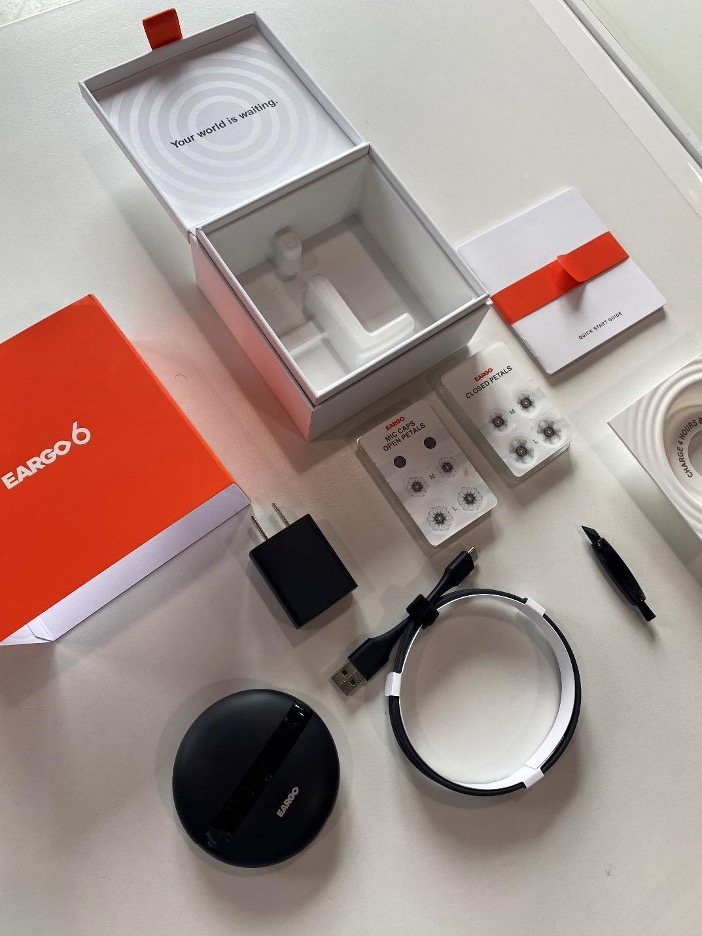
In general, customer service can also be reached outside of the app through phone calls and texts at 1-855-908-3867.
Eargo’s Online Hearing Test
Eargo offers a free online hearing test that can help you uncover your level of hearing loss in approximately 10 minutes. While we still recommend seeing an audiologist or other type of hearing professional for a full exam, Eargo’s test can be a great starting point on your hearing journey. In our research to find the best online hearing tests, we found Eargo’s to be the best for tone testing.
Our Experience Taking Eargo’s Test
To start, Eargo asks about your headphones, requests you set your volume to 50%, and then asks you to rub your hands together for 10 seconds before beginning the test to set a consistent volume level for the test. After that, the test begins. You’ll hear tones at various frequencies and volumes through your headphones and press the orange button that says, “I hear that.” The screening starts with your left ear, then moves to your right ear.
You’ll then answer questions about your hearing issues, such as if you have any misunderstandings during conversations, experience any trouble hearing TV or conversations, or feel any embarrassment about your suspected hearing loss.
During the test, you get to try Eargo’s hearing simulator that shows how your hearing could improve in various situations with the aid of their hearing aids, but we’re unsure of how tailored the simulator is to each tester’s hearing loss.
At the end of your test, you have to submit your contact information before you can get your results. Eargo will display your hearing results on a simple-to-read scale of one through five and suggest situations that may make your hearing loss more obvious and ask if they sound familiar. Eargo then recommends the appropriate hearing aids for your specific hearing loss.
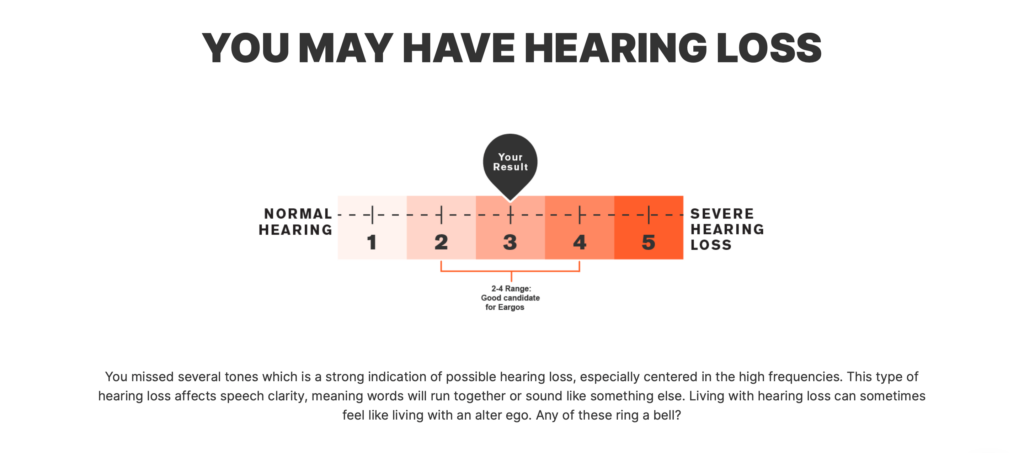
The downside to Eargo’s test: They won’t give you a visual audiogram. But, overall, Eargo’s tone testing is a good starting point for an online hearing test.
Warranty and Trial Period
Warranty Details and Limitations
Eargo offers a warranty on all its hearing aid models. Eargo 6 has a two-year warranty. Eargo 5, Neo HiFi, and Max have a one-year warranty. These warranties cover free unlimited repairs and a one-time replacement of hearing aids and chargers that are lost or damaged during the length of the warranty. The one-time repair is not free. Eargo charges $295 for each hearing device (not each pair) and for each charger. If one part of the hearing aid is replaced, the part for the opposite ear is still eligible for a one-time replacement. For products that need to be exchanged, Eargo will decide if you get a new or a refurbished replacement. The original warranty start date applies to the replacement, meaning the warranty doesn’t start over on the date the product was replaced. You’ll only get a new warranty if you buy a brand new product.
Are the unlimited repairs worth it? Warranty coverage for free unlimited repairs seems to have come in handy for Eargo buyers—100% of our AgingInPlace.org survey respondents said their Eargo hearing aids had to be repaired several times within the warranty period.
Warranties do not apply to Eargo products bought from marketplaces, like eBay, that Eargo doesn’t list as official distributors and does not cover damage from normal wear and tear, improper handling, chemical exposures, water immersion, or damage caused by third parties or non-authorized service centers.
Trial Period
Full refunds are available for Eargo hearing aids returned within the first 45 days of purchase. Eargo does not charge a restocking fee for returned devices during this time period. The return period starts the day you receive the product, not the date of purchase. To qualify for this full refund, all of the hearing system’s original components must be returned. You cannot get this full refund within the first 45 days if you’ve lost any of the components.
Are Eargo Hearing Aids Worth the Cost?
Eargo hearing aids are smaller than most other hearing aids and are worn completely in the ear canal, making them more discreet for people who are self-conscious about their hearing loss. Eargo also offers hearing aids at a more affordable price than some of its competitors. However, since Eargo hearing aids are for people with mild to moderate high-frequency hearing loss, they accommodate a less severe degree of hearing loss than some other brands.
Eargo’s newer, more expensive hearing aids do offer considerably more sound technology than older models and may be easier for the less tech savvy to use since they automatically adjust your hearing settings. With their top-of-the line model being cheaper than many other hearing aids and the option to finance, Eargo hearing aids may be worth the cost if you want a nearly invisible hearing aid and have mild to moderate high-frequency hearing loss.
Eargo Customer Reviews
Eargo’s customer ratings are 3.25/5 stars on the Better Business Bureau and 4.3/5 stars on Trustpilot and Consumer Affairs. The BBB gives Eargo an A- rating.
Eargo reviews on customer service and overall satisfaction are mixed. Some users report less than satisfactory results from Eargo when their hearing aids stop working efficiently. Others find Eargo hearing aids to be long lasting and powerful.
More specific complaints include a lack of response from Eargo’s ear-tapping feature and difficulty correctly placing hearing aids that use contact pins in their charger, although customer service reports this latter issue can be fixed by more frequently cleaning the hearing aids to remove wax buildup. Customers also say that they wish Eargo had an upgrade policy for current customers so newer models are more affordable for them, and that Eargo would replace hearing aids for free when they’re still under warranty.
Eargo’s more recent models, Eargo 6 and Eargo 5, tend to get the most positive customer feedback for noise cancellation and overall sound quality. Customers also give high ratings for Eargo’s discreet completely-in-the-canal style as an alternative to bulkier behind-the-ear hearing aids. Eargo hearing aids are also reportedly easy to clean.
Bottom Line
Eargo hearing aids are nearly invisible and less expensive than most other hearing aid brands. It’s important to note though that they only correct mild to moderate high-frequency hearing loss, which is why the brand´s free online hearing test is really helpful.
With Eargo´s hearing aids´ small size comes a technology trade-off: They can’t stream media and phone calls via Bluetooth like those produced by the brands Jabra Enhance (formerly Lively), Phonak, and Widex. All models except Eargo Max are able to connect to the Eargo programming app, either through a smartphone or their charging case. Eargo has good customer support, politely answering our questions when we spoke to representatives over the phone.
Eargo gets mixed reviews from users, ranging from poor to excellent. The brand´s more recent models tend to get the highest marks for sound quality and noise reduction.
Frequently Asked Questions
-
Original Medicare does not pay for hearing aids, including Eargo hearing aids. If you have a Medicare Advantage (Part C) plan, it may pay for your hearing aids. Check with your plan to be sure. HSA/FSA funds can be used to pay for Eargo hearing aids.
-
No. Eargo hearing aids are only designed for people with mild to moderate hearing loss in the high-frequency range.
-
Eargo hearing aids range in cost from $1,500 – $2,950 per pair.
-
According to Eargo, their hearing aid batteries will work for around three years. After that, they will continue to work but won’t hold a charge for as long as before. At that point, Eargo recommends getting a new pair of hearing aids.
WRITTEN BY
Alex is a writer and speech-language pathologist, specialized in caring for older adults with communication disorders. She writes health and medicine content, with a focus on hearing aids and medical alert systems for AgingInPlace.org.
View AuthorMEDICALLY REVIEWED BY
Dr. Magann Faivre is an audiologist with a passion for being active in audiology organizations, particularly concerning advocacy, patients’ rights issues, and teaching student leadership. She intimately grew up around hearing loss and empathizes with patients when discussing their hearing journey. She is dedicated to creating a positive and integrative hearing healthcare experience so patients leave informed and confident. Dr. Magann Faivre currently serves on The Audiology Project’s Board of Directors and on Northern Illinois University’s Advisory Board. She is a longstanding fellow of the American Academy of Audiology and Academy of Doctors of Audiology.
View ReviewerDo you want to cite this page? Use our ready-made cite template.
